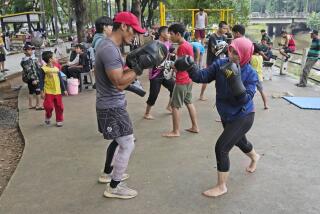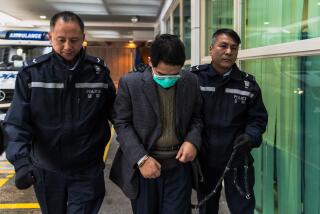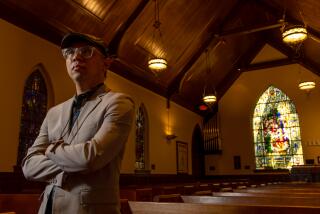Spouse-Abuse Therapy Tries to Alter Cultural Attitudes : Violence: Program aimed at Chinese-speaking men teaches them that they have no right to hurt their wives.
- Share via
Ted grew up believing “it’s a man’s world.”
In his native Vietnam, Ted saw his father and other men treat women as second-class citizens. The men made all the decisions, were masters of their homes, and hit their wives on occasion to demonstrate their power.
But things are different in the United States, Ted discovered when he came to this country 13 years ago. When he first kicked his American wife during a heated argument, he thought, “Big deal.” But she called the police.
Now, after his second spousal-abuse arrest, Ted, who is of Chinese descent, is being forced to rethink his own attitudes and behavior as part of a domestic violence program designed specifically for Chinese-speaking male spousal abusers.
The 2-year-old program provided by the Chinatown Service Center is believed to be the only one of its kind in the state, and possibly the nation.
While domestic violence and its treatment are difficult subjects to approach in any culture, they are especially taboo in Asian communities, where discretion and privacy are highly valued. Cultural attitudes justify abusive behavior by husbands as their right, and look with disfavor upon airing domestic conflicts outside the family.
Seeking counseling is thus considered shameful, and reporting domestic disputes to police is almost unheard of, social workers say.
So to tackle the problem, Chinatown Service Center program coordinator Vanda Yung and her staff took a Minnesota program, translated it into Chinese and modified certain parts to make them more palatable and understandable to Chinese immigrants.
One example was the topic of sexual abuse, which the Chinese culture does not even acknowledge can exist in a marriage. Yung and fellow program leader Eddie Chu thus avoid the term “rape” and try to carefully explain that sexual abuse is one form of domestic violence.
But perhaps the most difficult aspect for many of the men is taking responsibility for their actions, Yung said. Most of the men deny wrongdoing, believe they were forced into the program by authorities, and often blame their wives.
“They come in and say, ‘If she hadn’t yelled at me, I wouldn’t get upset,’ ” Yung said. “They always say, ‘Back home, none of this would happen.’ ”
Yung has also discovered that immigrants from China have a particularly difficult time with a segment of the program that requires each man to admit his problem and come up with a written plan for changing his behavior.
“It reminds them of the Communist system (in China), which requires those against the Communist Party to admit to all wrongdoings in a confession letter,” Yung said.
Yung said the men have opened up during the six months of group therapy sessions. “They finally get support from other men,” Yung said. “They say, ‘We never talk about these things outside of here.’ ”
The Chinatown center has always provided individual counseling for both victims and batterers but wanted to address the root of the spousal-abuse problem in a more effective manner, Yung said. After researching various programs, the center decided to create a program for Chinese immigrants based on the 7-year-old Domestic Abuse Intervention Project in Duluth, Minn.
The Chinatown program, which takes only court-referred, Chinese-speaking men, focuses on eight themes: nonviolence; non-threatening behavior; respect; support and trust; accountability and honesty; sexual respect; partnership, and negotiation and fairness.
Participants analyze their own controlling and abusive behaviors by watching videotaped examples and keeping a “control log.” The men also participate in role-playing and skill-building exercises to change behaviors and attitudes.
Participants pay $30 for each two-hour session held weekly at the Chinatown Service Center. About 22 men have gone through the program since its inception.
During a recent session, Ted and two other participants discussed methods of controlling their anger. One man, a 39-year-old Chinatown resident, said that staying calm and in control is often easier said than done.
Ted, who had already gone through the six-month program but was ordered by a judge to attend the sessions for a full year, offered encouragement, saying that he has learned to stop himself before the anger escalates. “I’ve learned to catch my breath, take a walk outside . . . cool off,” he said.
In fact, Ted said after the session, he and his wife now talk more rationally to each other. “We start to argue, but the situation doesn’t go anywhere. I don’t even touch my wife’s hand now when I’m angry,” said the Tujunga resident, who has been married 11 years and has a 10-year-old son.
His wife agreed the program has taught her husband strategies for curbing his quick temper, which she said can be triggered by “the stupidest little things.”
But she said she would like the program to include the wives and teach them the same techniques so partners can better understand each other.
Yung said the Chinatown Service Center would like to provide a parallel program for wives, but the agency does not have enough staff. She and Chu call the wives to monitor progress and offer them individual counseling.
Although the program is by no means perfect, it has helped men like Ted, who said he will do anything “to make the family better.”
“It’s not right for a wife to complain and call police . . . but I also take responsibility for what I’ve done,” he said. “I don’t have the right to use power to hurt my wife.”
More to Read
Sign up for Essential California
The most important California stories and recommendations in your inbox every morning.
You may occasionally receive promotional content from the Los Angeles Times.










